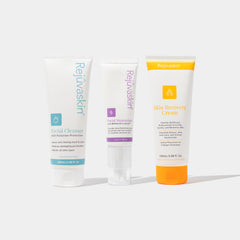It’s pretty well-known that sunscreen is an outdoor essential, protecting our skin from the sun's harmful UV rays. However, what many of us don't realize is that our choice of sunscreen can have a significant impact on the environment. Today, we’re going to answer some common questions, like is sunscreen bad for the environment, what makes sunscreen reef-safe, and what are the worst sunscreen chemicals. Let’s get started.
So, Is Sunscreen Bad For The Environment?
It absolutely can be— especially if everyone uses the same, harmful sunscreens.
Sunscreen can be bad for the environment when it contains certain chemicals that harm marine life and coral reefs. Chemical sunscreens often include ingredients like oxybenzone, octinoxate, and avobenzone, which are known to be harmful to aquatic ecosystems. When we swim in the ocean or other bodies of water, these chemicals can wash off our skin, ultimately leading to coral bleaching and harming marine life.
To mitigate this impact, it's essential to choose sunscreen that is labeled as "reef-safe." But, what makes sunscreen reef-safe?
What Makes Sunscreen Reef-Safe?
Reef-safe sunscreen is formulated to minimize its impact on coral reefs and marine ecosystems. The key factor that makes sunscreen reef-safe is the use of non-nano zinc oxide. Non-nano means that the zinc oxide particles are larger and less likely to be ingested by corals. As a physical sunscreen, it forms a protective barrier on your skin's surface, reflecting and scattering UV rays, rather than being absorbed by the skin.
What Are The Worst Sunscreen Chemicals For The Environment?
Several common sunscreen chemicals are known to be detrimental to the environment. These include:
- Oxybenzone: This chemical is a major offender, known to disrupt coral's reproduction and growth cycles. It also contributes to coral bleaching.
- Octinoxate: Like oxybenzone, octinoxate is harmful to coral reefs, leading to their decline.
- Avobenzone: While it effectively filters UV rays, avobenzone can become unstable in sunlight, forming toxic byproducts that are harmful to marine life.
- Octocrylene: It can accumulate in the environment, affecting aquatic organisms.
How Well Does Sunscreen Protect You From Skin Cancer?
We’ve seen that some types of sunscreens are bad for the environment; so, is wearing sunscreen really worth it?
While the impact of sunscreen on the environment is a significant concern, it's equally important to protect your skin from harmful UV radiation. Sunscreen remains a vital tool in preventing skin cancer. Mineral sunscreens, like our Mineral Facial Sunscreen, provide effective protection without the harmful environmental consequences. They create a physical barrier to block both UVA and UVB rays, safeguarding your skin.
Our Mineral Facial Sunscreen
Our sunscreen is a top choice for those who care about their skin and the environment. It contains non-nano zinc oxide, making it safe for reefs and marine life. Additionally, it's free of the harmful, active chemical compounds found in many traditional sunscreens. By choosing a non-nano zinc oxide sunscreen, you not only protect your skin but also contribute to the preservation of our delicate ecosystems.
Learn More About Mineral vs Physical Sunscreens →
So, next time you hit the beach, make sure you're well-equipped with sunscreen that cares for both you and Mother Nature. Pick up a bottle of our Mineral Facial Sunscreen today to protect your skin while protecting the environment.





















Leave a comment